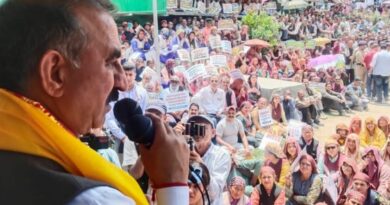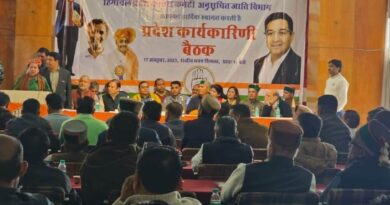Shimla District Hosts First Convention of Working Women’s Coordination Committee
The first district convention of the Working Women’s Coordination Committee, affiliated with CITU, was held at Kisan Mazdoor Bhavan in Chitkara Park, Kaithu, Shimla. During the event, Nisha Devi was elected as the Coordinator, Rajmila as the Co-Coordinator, and Himi Devi, Sarina, Bhumi, Shanti Devi, Nisha, Manjulata, Sheela Kayath, Vidya, Surendra, Bandana, Uma, Sunita, Sushila, Vidya Gajata, Rupa, Sulakshana, Shanta, Sangeeta, Manju, Asha, Reena, Pinky, and Sheetal were appointed as committee members.
The convention saw the participation of CITU State President Vijendra Mehra, Vice President Jagat Ram, District General Secretary Ajay Dulata, Treasurer Balak Ram, along with CITU leaders Sunil Mehta, Vivek Kashyap, Ramprakash, Virendra Lal, Sitaram, Pradeep, and hundreds of working women from across Shimla district. The attendees included women from areas such as Shimla, Rampur, Rohru, Theog, Jubbal-Kotkhai, Chidgaon, Nirmand, Sunni, Matiyana, Chopal, Kumarsain, Kusumpti, and Mashobra. Working women from IGMC, KNH, Chamiana, Mental, Rampur, and Rohru hospitals, Anganwadi, Mid Day Meal schemes, Nagar Parishad Rampur and Rohru, Saheb Society, STP, and Vishal Mega Mart also took part in the event.
The inauguration was done by CITU State President Vijendra Mehra, while Jagat Ram, Ajay Dulata, and Balak Ram addressed the gathering. They emphasized that women in Indian society face triple oppression, as they are exploited as women, as citizens, and as workers. Despite being promised equality by the Constitution (Article 14), they continue to live as second-class citizens in a semi-feudal capitalist society. Even though the Equal Remuneration Act was introduced in 1976, women continue to receive lower wages than their male counterparts in many sectors. This economic exploitation remains prevalent, and if women belong to the Dalit community, they also face caste-based discrimination, untouchability, and social marginalization, even though Article 17 of the Constitution prohibits such practices. Moreover, women are frequently subjected to gender-based violence and harassment. Despite being half of the population, women continue to suffer from exploitation, oppression, and are forced to live as second-class citizens in India.
Newly elected District Coordinator Nisha Devi and Co-Coordinator Rajmila stated that while the central and state governments often make statements about women’s empowerment, they fail to take concrete actions to ensure women’s self-reliance. Instead, they try to appease women with holidays for events like Karwa Chauth and Bhai Dooj, but they never ensure fair wages for them. Women working in sectors such as Anganwadi, ASHA, and Mid Day Meal programs are paid between four thousand to ten thousand rupees despite the Supreme Court’s 1992 order and the recommendations of the 1957 Indian Labour Conference, which suggest these workers should be paid at least 26 thousand rupees. Additionally, women employed as outsourced or contract workers earn very low wages, making it difficult for them to survive. Thus, women are subjected to significant social, gender, and economic exploitation.



